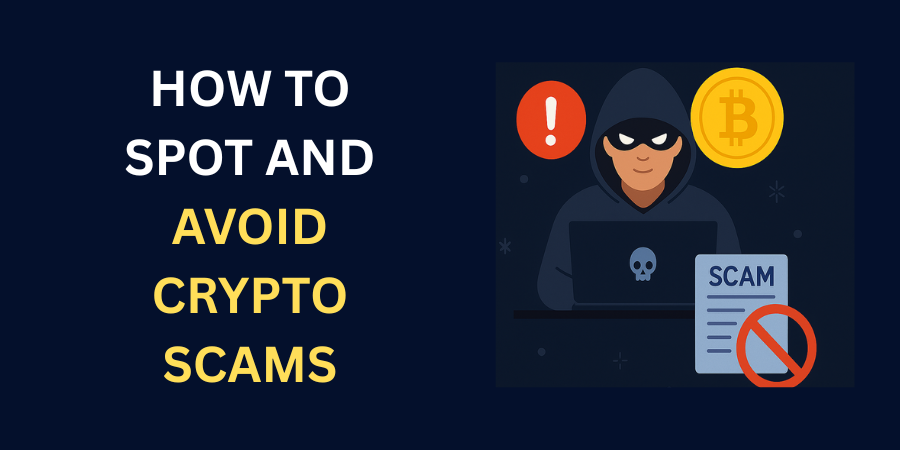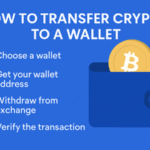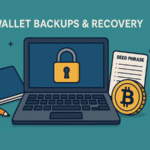Introduction
The cryptocurrency market offers incredible opportunities, but it also attracts scammers looking to exploit unsuspecting investors. From phishing attacks to fake giveaways, crypto scams cost victims millions of dollars every year.
This guide will help you spot and avoid common crypto scams, protecting your hard-earned assets. Whether you’re a beginner or an experienced trader, these security tips will keep you safe in the wild world of Web3.
Why Crypto Scams Are So Common
Cryptocurrency transactions are irreversible and often anonymous, making them a prime target for fraudsters. Unlike traditional banks, there’s no customer support to reverse fraudulent transactions—once your crypto is gone, it’s gone forever.
Key Statistics on Crypto Scams
- Over $4 billion lost to DeFi hacks and scams in 2023 (Chainalysis)
- Phishing scams account for 37% of crypto thefts
- Fake investment schemes lure victims with “too-good-to-be-true” returns
Most Common Types of Crypto Scams
1. Phishing Scams (Fake Websites & Emails)
Scammers impersonate legitimate platforms (like MetaMask, Coinbase, or Ledger) to steal login details.
How to Spot It:
- Fake URLs (e.g., “Metamask-login.com” instead of “MetaMask.io”)
- Urgent messages (“Your account will be locked!”)
- Poor grammar & unverified sender emails
How to Avoid It:
- Always check the website URL before entering credentials
- Use hardware wallets for extra security
- Enable 2FA (Two-Factor Authentication)
2. Ponzi & High-Yield Investment Scams
Fraudsters promise “guaranteed returns” (e.g., “Double your crypto in 30 days!”). These schemes rely on new investors to pay old ones—until they collapse.
Real-World Example:
- BitConnect (2017) – Promised 1% daily returns, collapsed in 2018, costing investors $3.45 billion.
How to Avoid It:
- If it sounds too good to be true, it is
- Research projects on CoinGecko, CoinMarketCap, and audits
- Avoid “secret trading strategies” with no transparency
3. Fake Giveaways & Celebrity Impersonations
Scammers impersonate Elon Musk, Vitalik Buterin, or crypto influencers, offering “free crypto” if you send them a small amount first.
Example Scam Tweet:
Giving away 10,000 ETH! Send 0.1 ETH to this address to receive 10 ETH back!”
How to Avoid It:
- No legitimate giveaway asks for crypto upfront
- Verify celebrity accounts (blue checkmark ≠ always real)
- Report & block scam accounts
4. Rug Pulls (Exit Scams in DeFi)
Developers abandon a project after raising funds, leaving investors with worthless tokens.
Red Flags of a Rug Pull:
- Anonymous team
- No audit (e.g., CertiK, SlowMist)
- Liquidity locked for only a few days
How to Avoid It:
- Check Dextools, RugDoc for scam warnings
- Look for doxxed (public) team members
- Avoid projects with no long-term utility
Step-by-Step Guide to Protecting Yourself
1. Research Before Investing
- Check CoinMarketCap, CoinGecko for legitimacy
- Look for audits (e.g., CertiK, Hacken)
- Search “[Project Name] + scam” on Reddit/Twitter
2. Use Secure Wallets
- Hardware wallets (Ledger, Trezor) for long-term storage
- Never share seed phrases (no legit service will ask for it)
3. Enable Security Features
- Two-Factor Authentication (2FA)
- Whitelist wallet addresses on exchanges
4. Be Wary of DMs & “Support Agents”
- Legitimate companies won’t DM you first
- Scammers pose as “customer support” to steal funds
What to Do If You’ve Been Scammed
- Report the Scam – File complaints with:
- FTC (U.S.)
- Action Fraud (UK)
- Local cybercrime units
- Alert the Crypto Community – Post on Reddit (r/Scams), Twitter to warn others.
- Freeze Accounts – If linked to a bank/exchange, contact support immediately.
Conclusion: Stay Alert, Stay Safe
Crypto scams are evolving, but awareness is your best defense. By following these steps, you can:
- Spot red flags before falling victim
- Protect your investments with secure practices
- Avoid emotional FOMO trading
Remember: If an offer seems too good to be true, it probably is. Stay skeptical, do your research, and keep your crypto safe!Identifying and Avoiding Crypto Scams



